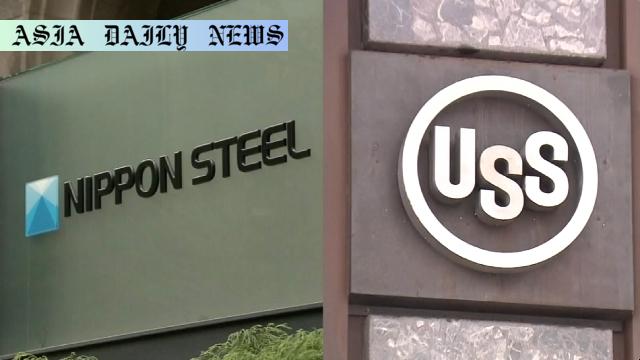Golden Share: Trump claims control of US Steel through ‘golden share’ amidst Nippon Steel’s acquisition.

Understanding the Concept of a ‘Golden Share’
The notion of a ‘golden share’ refers to a specific type of share that grants its holder special veto power over certain business decisions within a company. This exceptional provision exists to protect countries’ strategic assets or to secure national interests, especially in historically significant industries like steel production. President Trump recently introduced this concept in the context of US Steel, amidst Nippon Steel’s attempt to acquire the company. By asserting that he, as president, has control over US Steel’s golden share, Trump communicates a clear stance of ensuring strategic federal oversight over industries deemed essential for national security.
Historically, golden shares have been used by governments to safeguard their interests during foreign acquisitions. With global markets interconnected, acquisitions involving foreign entities often raise concerns about control over vital resources, technological advancements, and job retention domestically. The golden share is seen as a tactical instrument, enabling nations to ensure balance, even while promoting economic globalization and foreign investment.
Evaluating Nippon Steel’s Acquisition
Nippon Steel’s plan to acquire US Steel and turn it into a wholly owned subsidiary embodies the Japanese firm’s broader ambition for a robust presence in the global market. Steel, being foundational to infrastructure and industry, holds immense geopolitical importance. The acquisition is under scrutiny, as industries tied to national defense, such as steel production, hold high strategic value for the US economy and security.
The US Committee on Foreign Investment’s completion of Nippon Steel’s acquisition reexamines the ultimate plan’s feasibility. President Trump’s recent remark frames the acquisition not just as a corporate-level merger but as a national matter, further emphasizing the importance of the golden share. He has also assured the public that 51% of US Steel will remain under American hands, maintaining a majority stake and signaling strong protective measures against foreign overreach.
International Reactions and Implications
The global response to Trump’s assertion of control was swift. Japanese Industry Minister Muto Yoji acknowledged the president’s remarks but remained cautious, awaiting official communication before taking a formal position. This careful diplomacy reflects Japan’s sensitivity about maintaining healthy bilateral relations with the US while pursuing its business expansion goals. Nippon Steel, opting to refrain from commenting on Trump’s statements, appears focused on ensuring smooth negotiations ahead.
Such tensions highlight the delicate balance between economic globalization and national interests. As countries expand their economic ties through acquisitions and investments, domestic pushback often arises, especially when foreign ownership concerns intersect with a nation’s industrial backbone. The golden share’s prominence in this scenario could set a precedent for other nations to explore similar measures in critical industries.
Looking Ahead: Strategic Steel Industry Policies
For stakeholders, ranging from government officials to private investors, the US Steel-Nippon Steel acquisition represents a significant case study. If formalized, it could serve as a global benchmark for how strategic industries navigate acquisitions in an increasingly complex geopolitical environment. The inclusion of a golden share arrangement demonstrates prioritization of national security while balancing the importance of cross-border collaborations.
President Trump’s statement underscores the evolving role of governance in economic transactions. Whether future deals incorporate provisions like golden shares or develop equivalent measures, this scenario ultimately underlines the growing interdependencies between national policies and international commerce.
Commentary
The Influence of Golden Shares in Strategic Industries
The assertion by President Trump of a golden share in US Steel highlights an interesting intersection between federal policy and corporate governance. This type of financial instrument, while less common in corporate dealings, serves as a powerful reminder that some industries are too critical to be left solely to market dynamics. When national security concerns intersect with business decisions, golden shares, or similar mechanisms, provide reassurance to governments that they retain an essential degree of oversight.
For decades, the steel industry has been synonymous with industrial and national power. This makes Nippon Steel’s acquisition of US Steel more than just a corporate transaction; it becomes a platform for cultural, economic, and political dialogues, played out on an increasingly complex map of global interdependencies. Trump’s inclusion of the golden share in this discussion underscores US resolve to remain a key player in that dialogue and protect homegrown interests.
The Balance of Control in a Global Economy
Critics may view the administration’s approach as overly protectionist, potentially hindering globalization. However, when analyzed from a national security lens, industries like steel-producing facilities gain unique significance. The US assuring a majority stake in US Steel after the acquisition reflects a middle-ground mechanism of securing sovereignty while allowing global economic interconnectedness to flourish.
Trump’s golden share claim also exemplifies the ongoing debate in a world seeking globalization on fair terms without eroding sovereignty or competitive protectionism. As steel continues to underpin that broader conflict of ideas, whether the US government will wield its potential veto power is worth observing closely.


